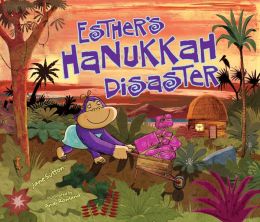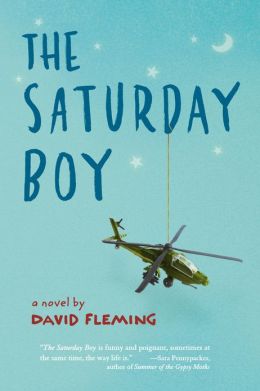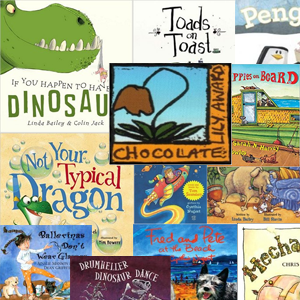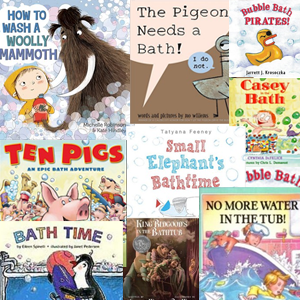 |
100 Days and 99 Nights: A Novel Ann Madison Illustrated by Julia Denos Seven-year-old Esmerelde Swishback McCarther (Esme), who is three years older than her brother Isaac (Ike), loves stuffed animals. Every morning before she leaves for school, Esme arranges her stuffed animals in alphabetical order on her bed. The story is told from Esme’s point of view, and from her description the reader meets her great parents. Following a legacy of news reporters, Esme’s mother is a writer for the monthly military newsletter, and Esme’s father is a sergeant in the U.S. Army. The McCarther family, along with their pets (a goldfish, a dog, and a lizard), has accompanied their father on his tours of duty in Korea, Kenya, Germany, and now Alexandria, Virginia. The home life of the McCarthers centers around the kitchen “where,” Esme explains, “we do all our most excellent cooking and all our most serious talking.” On school days, the family follows a precise morning routine, and Saturdays begin by making “tasty top-dog pancakes” from an old family recipe. The McCarthers love to spend time together, delight over the sounds and meaning of words, and even invent words, such as “fustilugs”. Everything is going well until “that Saturday” when Esme’s father tells his family that he has to go away for a tour of duty that will keep him away for 100 days and 99 nights. After their father leaves, the weekday routine disappears and they fail at their attempts to make pancakes on Saturday morning, making a trip to the usually shunned Pancake Palace necessary. Despite their challenges, this family copes with being separated while the father goes to war. And it has a happy ending! 100 Days and 99 Nights is a great read-aloud selection. It is a refreshing read about a family with parents actively involved in parenting. There are still the usual brother-sister squabbles, but during the absence of their father, Ike and Esme accept more responsibilities and become each others’ friend and protector. This novel emphasizes the importance of a father’s role in the home, of using words and not fists to solve problems, and highlights the significance of life’s rules and routines. Madison’s descriptive narrative captures Esme’s positive, inquisitive, and enlightening point of view, describing the weather as “ice-cream cold” and “oatmeal hot,” and father’s tour of duty as going by at a “hippo’s clumping pace.” The illustrations of the family and stuffed animals by Denos are perfect, and also included is “August Aloysius McCarther III’s Top Secret Rules [recipe] for Top-Dog Tasty Pancakes.” Rating: Outstanding.2008, Little, Brown, Intermediate [Ages 8 to 12], $14.99. REVIEWER: Sandra L. Tidwell (Childrens Book and Play Review). ISBN: 9780316113540 |
 |
Badd Tim Tharp Once the most popular boy in high school, Bobby returns home from Iraq as a young soldier no longer able to relate to himself, or the life he had left behind. He was discharged early because of drug possession, and comes home a very different person. In fact he had stolen a car and had to choose between joining the military or going to jail and this contributed to the lack of broad acceptance when he returned to his small home town. How does his sixteen-year-old sister, Ceejay, relate to this stranger whom she previously adored? His strength gave her the strength she needed. Although he was a risk-taker even in high school, his actions when he returns home go beyond taking risks to being reckless and self-destructive. A local eccentric with whom Bobby becomes friends adds some complexity to the story, and ensures an action-oriented ending. The author addressed PTSD, a timely topic for currently returning servicemen and their families, quite well through the lives of these characters. The reader will empathize with Ceejay and her family’s struggles after Bobby returns from combat. 2011, Knopf, Ages 14 up, $16.99. REVIEWER: Annie Laura Smith (Children’s Literature). ISBN: 9780375864445 |
 |
A Bear in War Stephanie Innes and Harry Endrulat Illustrated by Brian Deines Bear’s favorite day begins on a sleigh ride with a young girl, Aileen, at her new farm home outside Quebec City. Through the bear’s eyes and voice, readers meet Aileen’s younger brother, mother, and father. Bear and Aileen share secrets and feelings, helping young readers understand patriotism and war in Canada in the early days of WWI. When Aileen’s father signs up to fight, the happy hardworking family enters a new phase; the mother and children write about their chores and studies, trying to include their beloved father in their daily lives. The father writes about his war adventures, putting up a brave front. At Christmas, when Daddy is tired of fighting in the trenches of Belgium, Aileen and Teddy put their heads together and have a brilliant idea: Teddy will travel to Daddy to keep him company! When Daddy dies at Passchendaele in 1917, Teddy returns home with Father’s personal effects to console Aileen and her family. Based on a true story from the Innes family, the book is dreamily illustrated by Brian Deines and enriched with images of the children’s report cards, the medals awarded to Lawrence Rogers (Daddy), reproductions of the family letters and the circumstances from the death report. This gently told book shows that a hero can be the man next door who serves the greater good and encourages all Americans to remember their heroes, large and small. REVIEWER: Elisabeth Greenberg (Children’s Literature). ISBN: 978-1-55470-097-4 |
 |
Don’t Forget, God Bless Our Troops Jill Biden Illustrated by Raaul Colaon Based on her own family’s experience of having a loved one serve in a time of war, Jill Biden relates a little girl’s loneliness and anxiety as her Daddy must leave to do his duty for his country. Throughout the long year that her father is gone, Natalie goes about her everyday activities with thoughts of her father always present. In the winter she makes a snow soldier, and lovingly touches her Daddy’s name in a special prayer book at her church. Natalie talks to her dad via the computer, tells her class about him and his troop, and conquers swimming by pretending she is swimming to him. Wearing her favorite camouflage T-shirt and playing soldier puppets with her little brother makes her dad seem closer. When she helps her grandmother pack and ship boxes overseas, Natalie knows she is helping to bring a touch of home to the soldiers. Her mantra throughout the long ordeal is always “Be Brave, Natalie” and it is one that sustains the whole family. Finally, the day comes when Natalie can run across the tarmac to leap into her father’s arms and welcome him home. With so many children having a parent serving oversees, this sensitive reflection will be a comfort. This tender story will allow military children to see that they are not alone and will make others aware of the sacrifices made by families when a parent is deployed. Soft scratchboard illustrations in watercolor and pencil gently take the reader through Natalie’s year. Appended are numerous ways that individuals, schools, and community groups can support the military. While Biden’s story is very personal (she uses the actual names of her grandchildren) the experience is universal. Parents, classroom teachers, and school librarians will find a myriad of uses for the book. 2012, Simon & Schuster, $16.99. Ages 5 to 12. REVIEWER: Beverley Fahey (Children’s Literature). ISBN: 9781467700597 |
 |
Esther’s Hanukkah Disaster Jane Sutton Illustrated by Andy Rowland Based on her own family’s experience of having a loved one serve in a time of war, Jill Biden relates a little girl’s loneliness and anxiety as her Daddy must leave to do his duty for his country. Throughout the long year that her father is gone, Natalie goes about her everyday activities with thoughts of her father always present. In the winter she makes a snow soldier, and lovingly touches her Daddy’s name in a special prayer book at her church. Natalie talks to her dad via the computer, tells her class about him and his troop, and conquers swimming by pretending she is swimming to him. Wearing her favorite camouflage T-shirt and playing soldier puppets with her little brother makes her dad seem closer. When she helps her grandmother pack and ship boxes overseas, Natalie knows she is helping to bring a touch of home to the soldiers. Her mantra throughout the long ordeal is always “Be Brave, Natalie” and it is one that sustains the whole family. Finally, the day comes when Natalie can run across the tarmac to leap into her father’s arms and welcome him home. With so many children having a parent serving oversees, this sensitive reflection will be a comfort. This tender story will allow military children to see that they are not alone and will make others aware of the sacrifices made by families when a parent is deployed. Soft scratchboard illustrations in watercolor and pencil gently take the reader through Natalie’s year. Appended are numerous ways that individuals, schools, and community groups can support the military. While Biden’s story is very personal (she uses the actual names of her grandchildren) the experience is universal. Parents, classroom teachers, and school librarians will find a myriad of uses for the book. 2012, Simon & Schuster, Ages 5 to 12, $16.99. REVIEWER: Beverley Fahey (Children’s Literature). ISBN: 9781442457355 |
 |
Countdown Deborah Wiles The Cuban Missile Crisis of October 1962 forms the backdrop for this coming-of-age story of eleven-year-old Franny Chapman. Her life as a fifth grader has become very complicated. She has become invisible to her teacher; her college-age sister, Jo Ellen, has become quite secretive; her younger brother, Drew, is Mr. Perfect; her Uncle Otts is acting strangely and becoming increasingly more of an embarrassment to her. What is more, her best friend, Margie, is distancing herself from Franny. With the Cold War heating up as Russian missiles are within striking distance of her home near Washington, DC, Franny must deal with the threat of war as well as the unsettling events of her own life. Wiles brings together all the elements of the story as she creates a most satisfying ending. Interspersed with Franny’s story are photographs and text from songs, advertisements, and speeches from the 1960s. They provide background on the social and political events of the day for young readers, and bring back many memories for adults who lived through this time. Wiles’ beautifully written, carefully crafted tale immerses readers in the turbulence of the early 1960s while reminding us that human nature remains constant. The literary allusions to bright light and blindness are successfully carried throughout the story. The photographs are not chronologically presented, which may be a bit confusing to some readers at the younger age level–a very minor concern. This is Book One of “The Sixties Trilogy.” I anxiously await Book Two. 2010, Scholastic, Ages 10 to 14, $17.99. REVIEWER: Sharon Salluzzo (Children’s Literature). ISBN: 9780545106054 |
 |
If I Ever Get Out of Here Eric Gansworth Lewis Blake lives on the Tuscarora Native American Reservation in upstate New York with his mom and Uncle Albert, a disabled veteran who shares Lewis’s bedroom and his love of the Beatles’ music. The house is literally falling apart around them, with the kitchen roof collapsing and holes in the floors and walls. There’s no running water, no automobile, and his mom barely make ends meet by picking up cleaning jobs when she can. Lewis knows they are among the poorest families on the reservation, but their situation seems even more painfully confining when he has to leave the reservation school to attend the junior high school in town. It’s the mid-70’s and relations between those on the Res and the Whites in town are bad at best. Although Lewis is really bright, he is the only Native American in all of his classes and the other students actively shun him. But then, a new boy, George, arrives from the local Air Force base and can’t seem to be bothered with the local kids’ advice to stay away from “the wild Indians.” George and Lewis become friends, but their friendship is limited by Lewis’s inability to trust George and his inability to reciprocate the kinds of behaviors that actually build friendship, like having someone over to your house to just hang out and listen to records. When a girlfriend enters the picture, the friendship is tested even more. After Lewis becomes the victim of physical bullying that the teachers choose to ignore, however, George takes matters into his own hands. Gansworth employs an authentic voice to illuminate the challenges faced by Native Americans in dealing with the dominant, and often inhospitable, White culture. Still, there is a note of hope that people can reach across boundaries if they try. If readers liked Sherman Alexie’s Absolutely True Diary of a Part-Time Indian, this text will appeal. Lots of discussion possibilities for issues such as stereotyping, friendship, multiculturalism, and bullying. 2013, Levine, Ages 12 up, $17.99. REVIEWER: Paula McMillen, Ph.D. (Children’s Literature). ISBN: 9780545417303 |
 |
Make Me a Home Tamra Norton Author and mother of seven Tamra Norton earned the Utah Commission on Literacy’s “Book of the Month” award in April 2006 for young adult novel “Make Me a Memory.” Now, in Make Me a Home, Norton examines the difficult realities a young person must deal with when a loved one is deployed abroad for an extended period. Allie Claybrook spent most of her sixth-grade year as the ‘new kid’ of her elementary school; when Ivy Peterson and her handsome older brother Ty move to town, Allie befriends Ivy – but Celeste the most popular girl in Allie’s class, is as interested in Ty as Allie is! Make Me a Home weaves a tapestry of daily life as Allie learns ways to cope with her father’s deployment to Iraq and Ivy weathers her parents’ divorce. Together, Allie and Ivy learn the importance of friendship and a place to call home. Make Me a Home does not shy away from serious issues, yet is thoroughly accessible and amenable to young adults. Highly recommended especially for school libraries, and as a the starting point for discussions with young people who must face the difficulty of the separation from or loss of a central figure in their life. 2008, Bonneville Books, Ages 10 up, $12.99. REVIEWER: Midwest Book Review (Children’s Bookwatch,). ISBN: 9781599551135 |
 |
Off to War: Voices of Soldier’s Children Deborah Ellis Hilary Crew (VOYA, December 2008 (Vol. 31, No. 5)) There are some big differences between military kids and civilian kids. They don’t get to go down the same pathways we’ve passed through,” observes twelve-year-old Jasmine. These differences are heard through the voices of children and teens from Canada and the United States who have a parent or both parents serving in the armed forces. Whether they live on- or off-base, they talk openly about their lives, how they deal with a parent’s absence, and their fears for their parents’ safety. They discuss family relationships, including changes in their fathers or mothers after a tour of duty. Some have experienced the death of a parent or relative. Others talk about their strong relationship with the parent at home and about the hardships the family faces with absent parents. They express their opinions about war, think about future careers, and offer advice to others on how to cope as an “army kid. Each interview is prefaced by a paragraph that provides extra information, for example, on army bases, the National Guard, the war in Iraq, or support groups. Although the emphasis is on the “war trauma” that “can affect both the soldier and the soldier’s family,” these young people take pride in their parents’ service. Their voices are resilient. In the words of one young girl, “My advice for military kids is keep strong and don’t let anybody get you down.” These revealing interviews will provide insight into the “pathways” experienced by children and teens who also bear the burden of war. VOYA CODES: 4Q 3P J. 2008, Groundwood, Ages 12 to 15, $15.95. REVIEWER: Hilary Crew (VOYA). ISBN: 9780888998941 |
 |
Piper Reed, Campfire Girl Kimberly Willis Holt National Book Award winning author Holt draws on her own childhood experience as a Navy brat for her “Piper Reed” series. This fourth book once again emphasizes the hunger of move-a-lot kids for acceptance. It also adds the new theme of using holidays and non-changeable rituals like Halloween–which can be celebrated in any town or any base anywhere–as important stability points. When Piper’s best friend Michael wants a nerdy new boy to join their Gypsy Club, Piper gets snarky. But Stanley Hampshire will not go away. He even–horrors!–joins the Reed family and other base friends for an end-of-October weekend camping trip that Piper manages to turn into a Halloween celebration. Along the way, Piper not only comes to terms with the lost soul that is Stanley Hampshire, she even manages to help him out of his loneliness and back into the world. Piper gets to do a lot of growing, too. These are the Bobbsy Twins or the Happy Hollisters in a brave new world of dyslexia diagnoses, clinical shyness, and heart-breaking loneliness . . . peopled by nine- and ten-year-olds brave enough to overcome the lot. 2010, Christy Ottaviano Books, Ages 7 to 10, $15.99. REVIEWER: Kathleen Karr (Children’s Literature). ISBN: 9780805090062 |
 |
Out of the Blue S. L. Rottman Stuart Ballentyne has just made the move to Minot, North Dakota with his mother, who has recently been appointed Base Commander. Stuart is a fifteen-year old learning to cope with yet another tough move, this one without his father or his brother, who just left for college. Stuart befriends Billy Vinson, the youngest son in the family across the street. Soon after the move, Stuart discovers something amiss in the Vinson family. He suspects that Billy’s older stepbrother is abusing him but cannot prove anything. As Stuart spends more time in Minot, he feels torn between trying to help the Vinson family and attempting to get life back to normal. When Stuart’s mother is deployed, she leaves Stuart at home with her secretary. He soon makes some decisions that will forever change his life. Through the events that unfold during the climax of the novel, Stuart learns many lessons about adulthood such as taking responsibility for his actions and valuing strong family ties, parental discipline and guidance. Rottman’s use of instant message chatting to help fill in holes in the plot is an interesting technique that will make the story relevant to teens but might also, in time, date the novel. Rottman has created a believable yet entertaining novel. 2009, Peachtree Publishers, Ages 15 to 18, $16.95. REVIEWER: Michael Mauhar (Children’s Literature). ISBN: 9781561454990 |
 |
Refresh, Refresh: A Graphic Novel The title of this graphic novel comes from the act of refreshing an e-mail inbox often to see if anyone has replied, in this case, teens’ fathers who have gone off to Iraq to fight in the war. Cody, Josh, and Jordan miss their dads and stay busy by beating each other up in the back yard (to make themselves stronger), hang out at the local bar and drink alcohol, hook up with older women, and participate in a slew of other activities that are pretty risky but make sense, feeling left behind. Of the three, Josh’s future looks the least bleak as he receives an acceptance letter to college. The story is well drawn, with the damage from the fight scenes among the teens evidenced in painful black eyes and blood. The day-to-day living is also painful when the power has been shut off because the bills are not being paid. Although the story is never really upbeat, it will probably ring familiar to readers whose parents have gone off to fight in the war or are simply absent for various other reasons. It is a good book for discussion as it touches on tough topics with which many teens may be wrestling, whether or not their parents play a large role in their lives. VOYA CODES: 3Q 4P J S. 2009, First Second Book, Ages 12 to 18, $17.99. REVIEWER: Kelly Czarnecki (VOYA). ISBN: 9781596435223 |
 |
The Saturday Boy David Fleming Eleven-year-old Derek has been having a rough time, both at school and at home, since his helicopter pilot father returned to Afghanistan with the Army “eight months, one week, and four days” ago. Derek’s mother is struggling with worried exhaustion, and his former best friend Budgie is antagonizing Derek at every opportunity. Derek relies on the comforts of his father’s letters, his wild imagination, his favorite superhero show, and his rehearsals for the school play (along with his crush Violet), but when his deepest fears are realized, Derek is forced to navigate a tumult of complex emotions and reevaluate what he values most dearly. Fleming’s debut skillfully depicts how the stresses of loss and other forces beyond one’s control test the bonds of family and friends; Derek’s relationship with his mother is especially honest and tender. The weight of the tragic, topical events is tempered by moments of laugh-out-loud humor and Derek’s energy and resilience as he muddles through the uncertainty of grief. 2013, Viking, Ages 10-up, $16.99. REVIEWER: Publishers Weekly (Publishers Weekly). ISBN: 9780670785513 |
 |
Shooting the Moon Frances O’Roark Dowell T. J. Dexter couldn’t wait to enlist in the Army at age eighteen, following his father, the Colonel, into a military career. His thirteen-year-old sister, Jamie, couldn’t be more proud or more jealous of his likely deployment to Vietnam. Both siblings are therefore surprised when the Colonel isn’t at all happy about his son’s decision and tries to dissuade him before the commitment locks in. After T. J. wins out, he’s sent overseas, and soon his mail begins arriving at the house letters to his parents talking up the lousy food and good comradeship, and rolls of undeveloped film to his sister. Jamie uses her volunteer position in the base recreation center to learn to develop the film on her own, and each roll tells her a little more about his true circumstances than her parents’ letters reveal. Jamie begins to realize that her brother has had a harsh confrontation with reality, and the glamour of war loses its shine for her as well. With a clearer idea of what Vietnam service entails, Jamie importunes the Colonel to change the orders of her friend, Private Hollister, and leave him in a stateside posting, only to discover that her seemingly gung-ho father had, in fact, petitioned one of his superiors for the same consideration for T. J. and had been turned down. There is no shortage of children’s literature on wartime disillusionment, but Dowell approaches the discussion from a different angle, studying the complex emotions of the larger-than-life Colonel his pride and dedication to the military and his country, his respect for his maturing son’s decisions, and his paternal instinct to keep his son from harm’s way. That the Colonel’s interior crisis is witnessed by his adoring daughter, who is experiencing a rude awakening of her own, makes the drama all the more poignant. There is comfort in an ending that assures readers that T. J. makes it home alive, but readers are left to ponder whether the next generation of the Dexter family will be quite so anxious to enlist Review Code: R — Recommended. 2008, Atheneum, Grades 4-8, $16.99. REVIEWER: Elizabeth Bush (The Bulletin of the Center for Children’s Books). ISBN: 9781416926900 |
 |
Somebody Please Tell Me Who I Am Harry Mazer and Peter Lerangis Mazer (Heroes Don’t Run) and Lerangis (wtf) use strong characters and storytelling to explore the slow and painful recovery of an injured teenage soldier. High school senior Ben has great grades and a potentially bright future in the arts, so his friends, family, and girlfriend are all surprised when he enlists in the military. And they are horrified when he is quickly deployed to Iraq, where he receives a head injury and suffers brain damage in the line of duty. The story is divided into Before, During, and After sections; Mazer and Larangis shift their focus among the prominent people in Ben’s life, including his autistic brother, Chris; his best friend, Niko; and his fiancé, Ariela. The authors carefully demonstrate the effect the tragedy has on everyone involved, particularly Ariela’s attempts to maintain a social life in college, while vividly bringing Ben’s struggles to life. (One chapter simply shows a scribble on a sheet of paper, Ben’s attempt to write.) Readers will likely sense where the story is headed, but the journey is powerful and worthwhile. 2012, Simon, Ages 12 up, $15.99. RREVIEWER: Publishers Weekly (Publishers Weekly). ISBN: 9781416938958 |
 |
The Summer Before Boys Nora Raleigh Baskin The summer of 2004 means both good and bad for twelve-year-old Julia. The good is that she’s spending it with her best friend and “cousin” (actually niece) Eliza, whose father works at a woodsy resort hotel where the girls run wild and imagine themselves into various ongoing pretend scenarios and characters. The bad is that she’s deeply anxious about her absent mother, who’s serving in Iraq, and who connects with her daughter only through occasional emails and phone calls. Both good and bad is Julia’s new interest in boys, specifically Michael, another resort employee’s son, who inspires a crush in Julia that leads her to start pushing Eliza aside to focus her attention on him. Books for young readers tend to favor the story of the girl who’s left behind by the boy-crazy friend, so it’s refreshing to see events from the viewpoint of the girl who’s pulling away. Julia’s narration sympathetically reflects her quandary as cute boys start figuring more significantly in her imagination than old-timey pretends (“I wanted to play, but it was harder to make it happen,” she laments), but she’s not looking to lose her dear friend, either. The thread about her mother’s absence sharpens the intensity of Julia’s emotions and also accentuates her swings between childhood and adolescence, as the fears of her mother’s loss send her back periodically into childish need. Baskin never treats either Julia’s old or new interests as frivolous, instead documenting them respectfully as valid stages in a life, all the while setting the changing of those stages against an appealing summery backdrop of freedom, intrigue, and free ice cream. Review Code: R — Recommended. 2011, Simon, Grades 5-7, $15.99. REVIEWER: Deborah Stevenson (The Bulletin of the Center for Children’s Books). ISBN: 9781416986737 |
 |
Suzanne Collins Diane Bailey This title from the All About the Author series is about Suzanne Collins, the popular author of The Hunger Games series. It tells that she grew up in a military family and was inspired to write books to show how evil war can be. Her books are often compared to Lois Lowry’s The Giver (Bantam, 1993/VOYA August 1993). The majority of the book is devoted to the success of the The Hunger Games trilogy and the forthcoming movies. The writing is very colloquial, with many quotes by the author. Students will love the fast-paced dialogue in these colorful, illustrated biographies of their favorite authors. Each volume contains insights into what inspired the authors to write, who their role models were, where their ideas came from, and how they handled success. The books are timely, quick reads and will appeal to fans of the popular authors. (All About the Author) VOYA CODES: 4Q 4P M J. 2012, Rosen, Ages 11 to 15, $34.60. REVIEWER: Ellen Frank (VOYA). ISBN: 9781448869381 |
 |
Why Are You So Scared?: A Child’s Book About Parents with PTSD Beth Andrews Illustrated by Katherine Kirkland What a switch–this is a book that explains to children the problem that a parent may be having and it is labeled Post Traumatic Stress Disorder (PTSD). The author makes it clear that the child is not responsible and that this problem was brought on by some traumatic incident in a parent’s life, with several examples given. When a parent suffers from PTSD, he or she may not sleep well and therefore could be grouchy the next day or forget about something important in the child’s life like attending sporting events or not keeping a promise. Sometimes parents have panic attacks, have scary dreams or seem like they are day dreaming and acting like you are not really in their thoughts. Suggestions are made as to how a child should react to each of these situations. Parents may see a psychiatrist or be part of a therapy group and kids should know that their parents are working hard to overcome PTSD. It is OK to have feelings of anger, frustration and sometimes be scared but a child’s real job is to “be a kid, play, have friends and do your very best in school. It’s OK to have fun and be a kid even when mom or dad is feeling bad.” The watercolor illustrations are realistic and kids should be able to relate to them. There is an extensive note to parents and caregivers on the closing pages. While this book contains very good information, it may be a bit overwhelming and my recommendation would be to read it in small bites, probably with a trusted adult relative, friend or counselor. 2012, Magination Press, Ages 4 to 8, $14.95. REVIEWER: Marilyn Courtot (Children’s Literature). ISBN: 9781433810459 |
Military Families
|
Veteran’s Day and Military Family Appreciation Month both fall in November. Whether deployed in the United States or abroad, military families face unique challenges. Families are often separated when the military spouse or sibling serves overseas, while the rest of the family is stateside. Their contributions to our country’s well being and safety are immeasurable. Use this month to help youngsters develop an appreciation for those who serve with the books below. Web links to additional information and activities about Military Families follow these reviews. Contributor: Peg Glisson |
Reviews
|



